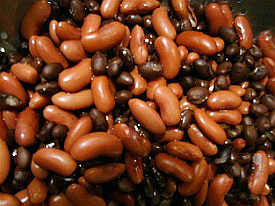Category: "Uncategorized"
Шишка
The Russian word шишка can be translated into English 'bigwig', 'big shot', 'head honcho', so on and so forth. It can also mean 'cone,' but we'll be focusing more on the 'big shot' context today:
| Sg | Pl | |
| Nom | шишка | шишки |
| Acc | шишку | шишки |
| Gen | шишки | шишек |
| Pre | шишке | шишках |
| Dat | шишке | шишкам |
| Ins | шишкой | шишках |

Here are some example sentences:
| Шишка на подходе! Быстро! Спрячьте водку! | The bigwig is coming this way! Quick! Hide the vodka! |
|
— Кто это такой? — Это Гордон Гекко, он большая шишка. |
“Who the heck is that?” “That's Gordon Gekko. He's a big shot.” |
| В этом кашемировом костюме он похож на большую шишку! | He looks like a big shot in that cashmere suit! |
|
— Где шишки? — Они стоят на балконе, курят сигары. |
“Where are the bigwigs?” “They're out on the balcony smoking cigars.” |
Фасоль
The Russian word фасоль means 'bean,' as in the beans that are eaten by people. It declines as such:
| Sg | Pl | |
| Nom | фасoль | фасоли |
| Acc | фасоль | фасоли |
| Gen | фасoли | фасолей |
| Pre | фасоли | фасолях |
| Dat | фасоли | фасолям |
| Ins | фасолью | фасолями |
Interestingly enough, the word фасоль is really only used in reference to beans that Russians eat. Боб is another word for beans, but it usually refers to beans that Americans eat, which it can also mean farm animal feed. It's theorized that the use of боб instead of фасоль was the result of a translation snafu way back when. Most Russians prefer фасоль in general though for the smaller beans that you eat, such as, kidney, pinto, and black. When Фасоль is used in the plural it refers to different types of beans, not individual bean seeds. The word is used only in the singular to refer to beans that are used as food.

Here are a few sample sentences:
| Я ненавижу фасоль, она противная! | I hate beans, they're gross! |
| Фасоль полезная, она содержит много белка. | Beans are good for you. They contain a lot of protein. |
| Когда он ест фасоль, он часто пукает. | When he eats beans, he farts a lot. |
| Она съелa три тарелки фасоли! | She ate three platefuls of beans! |
Don comments: Thanks for the entry about beans, Natasha. I nearly decided to edit out your line about фасоль being used for the beans Russians eat and бобы more commonly for the beans that Americans and animals eat, but then I realized that I've heard the word фасоль used a lot in Russia, but I don't think I've ever discussed бобы there. So I've decided to leave the entry as it is, and hopefully some of our readers will chip in their two cents. I suppose I should note that technically there is a difference between фасоль and бобы. If you are in an anal-retentive mood, you can see a discussion of it here (mirror).
Кирпич, часть первая
The Russian word for brick is кирпич. It is an end-stressed noun, so it declines like this:
| Sg | Pl | |
| Nom | кирпич | кирпичи |
| Acc | ||
| Gen | кирпича | кирпичей |
| Pre | кирпиче | кирпичах |
| Dat | кирпичу | кирпичам |
| Ins | кирпичом | кирпичами |
Generally speaking, if you are discussing the substance out of which something is made, then you usually use кирпич in the singular.
| Музей построен из красного кирпича. | The museum is made of red brick. |
| Вокруг дома стояла прочная стена из кирпича производства компании Аккрингтон. | Around the house there was a sturdy wall of Accrington brick. |
Of course, if you are counting the bricks the word can occur in the singular and the plural.
| После торнадо все было разрушено. От нашего дома остался только один жалкий кирпич. | After the tornado every was destroyed. Only one pitiful brick was left of our house. |
| Чтобы достроить стену, нужно еще только два кирпича. | We only need two more bricks to finish the wall. |
| Я построил книжный шкаф из двадцати шести кирпичей и шести досок. | I built a bookshelf from twenty-six bricks and six boards. |

There is more to be said about this word, but that will have to wait till the next couple of entries.
Translating humor, part II
Among the April 1st offerings on Facebook this morning is a picture from Баба і кіт that made me laugh out. Let's have a little translation contest.
- Read over Natasha's entry on крыса my entry on Translating humor, part I. (They are the two entries before this one.
- Come up with an English translation for the the two sentences above the picture that captures the humor of the picture.
- At the end of April I will make a completely subjective decision about which one I like best and send the author ten bucks as a reward.
Here's the picture.

Уходить/уйти
The verb pair уходить/уйти is usually translated as “to leave, depart” or in some contexts just “to go.” Notice that there is an й in the perfective infinitive:
| Imperfective | Perfective | |
| Infinitive | уходить | уйти |
| Past | уходил уходила уходило уходили |
ушёл ушла ушло ушли |
| Present | ухожу уходишь уходит уходим уходите уходят |
No such thing as perfective present in Russian. |
| Future |
буду уходить будешь уходить будет уходить будем уходить будете уходить будут уходить |
уйду уйдёшь уйдёт уйдём уйдёте уйдут |
| Imperative | уходи(те) | уди(те) |
Here are a couple of examples:
| Папа, не уходи!. | Daddy, don’t go away! |
| Во сколько ты уйдёшь? | What time will you leave? |
| Она всегда уходит так рано! | She always leaves so early! |
| Нина ушла от Миши в 2003-ем году. | Nina left Misha in 2003. |
In English the verbs leave and depart mean roughly the same thing, but they have a grammatical difference. We don't use the preposition from with leave, but we usually use from with depart. Thus we have:
She departed from the university at 8.
In Russian if you mention the place you are leaving, you must *always* use the ‘from’ word with its noun. For this verb you use the typical ‘from’ equivalents. For example:
| Таня ушла из университета в пять часов. | Tanya left the university at 5. or Tanya departed from the university at 5. |
| Мы обычно уходим с работы в 5. | We usually leave work at 5. or We usually depart from work at 5. |
| Я уйду от бабушки в 5. | I will leave Grandma’s at 5. I will depart from Grandma’s at 5. |
When you depart a place, you are usually heading somewhere specific; that is, you are going *to* a place. For that reason the typical Russian prepositions of motion will work, e.g. в/на + accusative or with к + dative:
| — Где папа? — Он ушёл в лабораторию. |
“Where is dad?” “He has gone to the laboratory”. or |
| — Где мама? — Она уже ушла на работу. |
“Where is Mom?” “She has already gone to work.” or |
| — Где Таня? — Она ушла к Ире. |
“Where is Tanya” “She has gone to Ira’s place.” or |